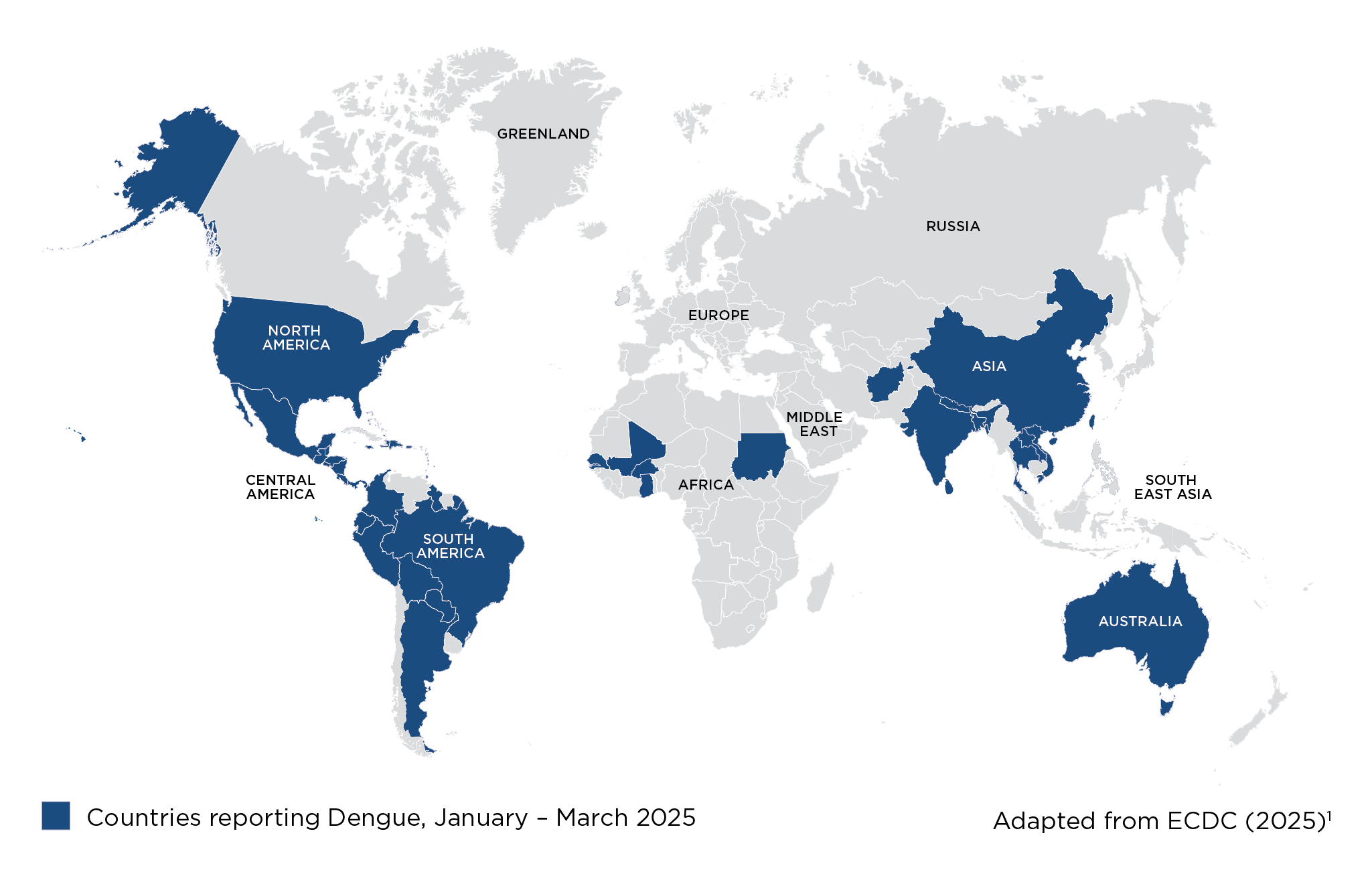About half of the world’s population is at risk of dengue fever with an estimated 100-400 million infections occurring each year.2
Risk areas for Dengue Fever

FAQs
-
Key fact
-
How do you get dengue fever?
When bitten by mosquitoes carrying the virus. These mosquitoes can also carry other viruses such as chikungunya, yellow fever and zika.3
-
Which countries are affected by dengue fever?
Over 100 countries, including in Africa, the Americas, Eastern Mediterranean, South East Asia and the Western Pacific are affected. Dengue is also spreading to new areas, including Europe, the Eastern Mediterranean, and South America (see map).1,2
-
What are the symptoms of dengue fever?
Most people with dengue have mild or no symptoms. If symptoms occur, this is usually between 4 and 10 days after being bitten, and they usually last for 2-7 days.2 Therefore, you may start to feel ill when you are back home after your trip. Symptoms may include: severe headache, pain behind the eyes, muscle and joint pain, nausea, vomiting, swollen glands or a rash.2
-
How serious is dengue fever?
In most cases, dengue is mild. But in rare cases it can be life-threatening.2 In severe cases it can cause shock, internal bleeding, and death.4
-
Can I prevent getting dengue fever?
You can take the following precautions to help reduce your risk of infection:
- Visit your nearest convenient pharmacy or specialist travel health clinic for a risk assessment before your trip
- Use a recommended insect repellent containing either Picaridin, DEET, PMD or OLE (oil of lemon eucalyptus), IR3535 or 2-undecanone3
- Wear appropriate clothing (e.g loose fitting long-sleeved clothes, long trousers, socks and shoes) to minimise exposed skin5,6
- Use mosquito nets if you are sleeping or resting in unscreened accommodation or sleeping outdoors during the day or night5
Ready to get started? Check now for your nearest travel health clinic.
Get friendly advice from the UK's largest network of travel clinics*.
* This list is not exhaustive and other travel health providers are available.
References
- European Centre for Disease Prevention and Control. Dengue worldwide overview. Three-month dengue virus disease case notification rate per 100 000 population, January 2025-March 2025. March 2025. Available online: https://www.ecdc.europa.eu/en/dengue-monthly (Last accessed May 2025)
- World Health Organization. Fact sheets. Dengue and severe dengue. April 2024. Available online: https://www.who.int/news-room/fact-sheets/detail/dengue-and-severe-dengue (Last accessed May 2025)
- Centers for Disease Control and Prevention. Yellow Book 2026. Environmental Hazards and Risks. Mosquitoes, Ticks, and Other Arthropods. May April 2025. Available online: https://www.cdc.gov/yellow-book/hcp/environmental-hazards-risks/mosquitoes-ticks-and-other-arthropods.html (Last accessed May 2025)
- Centers for Disease Control and Prevention. Dengue. Symptoms of Dengue Testing. May 2024. Available online: https://www.cdc.gov/dengue/signs-symptoms/index.html (Last accessed May 2025)
- UK Health Security Agency. Mosquito bite avoidance for travellers. January 2023. Available online: https://www.gov.uk/government/publications/mosquito-bite-avoidance-for-travellers (Last accessed May 2025)
- Fit for Travel. General Travel Health Advice. Mosquito Bite Avoidance. Available online: https://www.fitfortravel.nhs.uk/advice/malaria/mosquito-bite-avoidance (Last accessed May 2025)
UK-BOTB-2500028 May 2025
